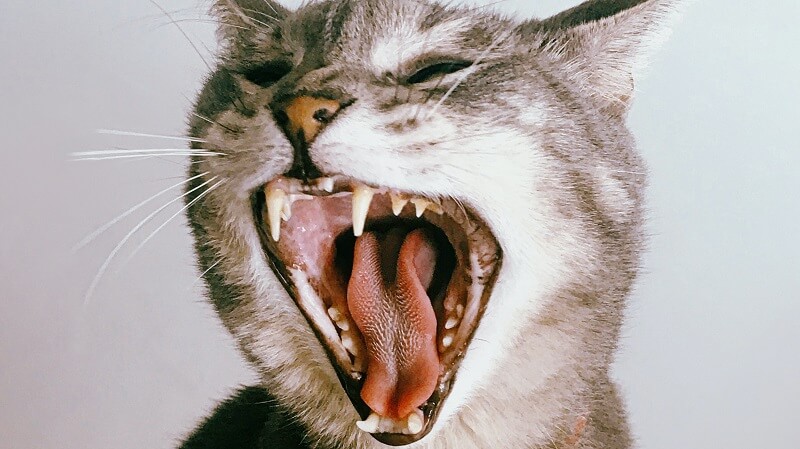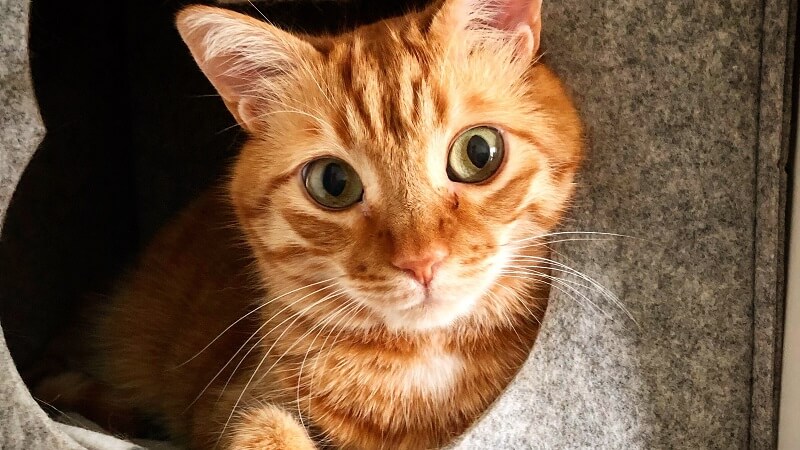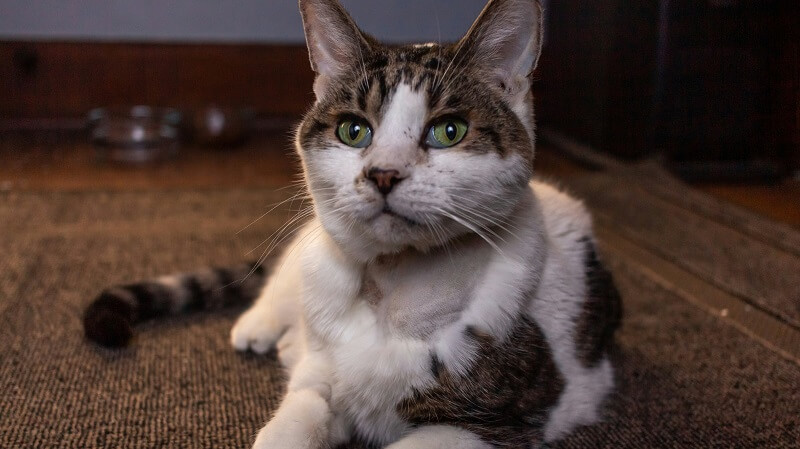
Top 10 Essentials To Help Winter Cats Keep Out The Cold
As the temperature drops, our winter cats need extra care to stay warm and comfortable. Just like us, cats feel the winter chill and seek

Has your home turned into an impromptu opera house courtesy of your feline friend’s screaming cat vocal prowess?
If you’ve been jolted awake in the middle of the night by the unmistakable sounds of a screaming cat, you’re not alone.
Many cat owners have experienced this unsettling phenomenon.
However, rest assured that there are ways to decipher the mystery behind your cat’s screams and, more importantly, how to calm them down.
The first time you hear your cat let out a blood-curdling scream, it’s natural to feel alarmed.
You might wonder, “Is something wrong with my cat?” or “What’s causing this bizarre behavior?”
Understanding and addressing the reasons behind your cat’s screams is crucial for both your peace and your cat’s well-being.
Screaming cats can be a source of stress for pet owners, and it often signifies that something is amiss in your cat’s world.
Whether it’s a medical issue, stress, or a simple desire for attention, there’s always a reason behind the screaming.
In this comprehensive guide, we will explore the common causes of a cat’s screaming and provide you with effective solutions to calm your feline companion.
Identifying why your cat is screaming is the first step towards finding a solution. Cats are known for their vocal nature, but excessive screaming or yowling can be distressing for both you and your pet. Let’s delve into some of the common reasons behind a cat’s screams:
Cats can be quite vocal when they’re hungry or eager to be fed. If your cat associates their screams with being fed, they may use this behavior to get your attention. This is particularly common in the morning when your cat is ready for breakfast.
Cats are known for their love of attention. If they feel neglected or are in the mood for play, they might scream to grab your focus. This is their way of saying, “Hey, pay attention to me!”
Cats are sensitive creatures, and changes in their environment or routine can lead to stress and anxiety. They may scream when they feel threatened, uncomfortable, or anxious about a new addition to the household.
Screaming can sometimes indicate underlying medical problems.
Conditions like hyperthyroidism, high blood pressure, or dental pain can cause discomfort and lead to vocalizations.
If your cat’s screaming is persistent and unexplained, consult your veterinarian.
If you have multiple cats, they may engage in territorial disputes.
Screaming can be a way for them to establish dominance or challenge another cat’s authority in the household.
Cats are natural hunters and need mental and physical stimulation.
If they are bored or restless, they may scream out of frustration or a desire for entertainment, especially during nighttime hours.
Understanding the context of your cat’s screams is essential for determining the cause and finding the most suitable solution.
Once you’ve identified the cause of your cat’s screaming, you can take steps to address the behavior.
Creating a calming environment and using behavioral training techniques can significantly reduce or eliminate screaming episodes.
Here are some strategies to consider:
Ensuring your cat gets enough playtime and interaction can help expend their energy and reduce boredom-induced screaming. Interactive toys and engaging with your cat in structured play sessions can be highly beneficial.
Designate quiet spaces where your cat can retreat to when they need a break. Providing cozy hiding spots or cat trees can give your feline friend a sense of security and a place to escape when feeling overwhelmed.
Use positive reinforcement techniques to encourage quiet behavior. Reward your cat with treats or affection when they are calm and not screaming. Over time, they will associate being quiet with positive outcomes.
Establish a consistent feeding schedule to address mealtime-related screaming. Cats thrive on routine, and feeding them at the same times each day can help reduce their anxiety about mealtime.
Enrich your cat’s environment with toys, scratching posts, and puzzles to keep them mentally and physically engaged. Cats that are mentally stimulated are less likely to scream out of boredom.
Understanding your cat’s unique language and responding appropriately can go a long way in calming a screaming cat.
Cats use vocalizations as a means of communication, and it’s essential to interpret their signals correctly.
Here’s how you can foster better communication with your feline friend:
Cats communicate not only through sounds but also through body language. Pay attention to their tail position, ear orientation, and overall posture to understand their emotions and needs.
When your cat screams, take the time to respond calmly and assess the situation. Are they hungry, frightened, or in pain? Responding appropriately to their vocalizations can help address their specific needs.
Building a strong bond with your cat based on trust and understanding is essential. Spend quality time with them, provide affection, and create a safe and loving environment. When your cat feels secure, they are less likely to scream for attention or out of fear.
Sometimes, a cat’s screaming might be indicative of underlying health problems. It’s crucial to rule out any medical reasons for their behavior by consulting a veterinarian.
Regular check-ups can help identify issues before they manifest as screams.
Conditions like hyperthyroidism, high blood pressure, or even dental pain can cause a cat to scream, so a thorough health evaluation is necessary.
While addressing the root causes of your cat’s screaming is essential, certain products can help alleviate their distress and make both your and your cat’s lives more peaceful.
Here are some product recommendations:
A cat cave can provide a secure and quiet retreat for a screaming cat.
These cozy hideaways offer a safe space for cats to unwind and feel protected, thus reducing their need to scream.
They are particularly useful for shy or nervous cats who may feel overwhelmed in open spaces.
Natural calming sprays and stress-relieving products can soothe a screaming cat.
Products with ingredients like lavender or pheromones can help relax your cat and alleviate their stress.
These can be used in areas where your cat spends most of their time or in new environments to help them adjust.
Engaging your cat with interactive toys can divert their attention and reduce screaming.
Toys that stimulate their hunting instincts can be particularly effective in channeling their energy positively.
Puzzle feeders, laser pointers, or feather wands are excellent options to keep them occupied and entertained.
Providing a comfortable sleeping area can help a screaming cat relax.
Orthopedic beds or cushioned mattresses offer the comfort cats seek and can help them feel more secure and less inclined to scream.
These beds also provide support for older cats or those with joint issues, improving their overall comfort.
Nutritional supplements can stabilize a cat’s mood and reduce screaming.
Omega-3 fatty acids, for instance, are known for their calming effects and can be beneficial in a screaming cat’s diet.
Consult with a veterinarian to determine the best dietary supplements for your cat’s specific needs.
Dealing with a screaming cat can be challenging, but with the right approach and tools, you can help soothe their distress.
Understanding the root causes, creating a calming environment, and using targeted products like cat caves or calming sprays can make a significant difference.
Remember, patience and consistency are key in transforming your noisy feline into a peaceful companion.
With these strategies, you and your cat can enjoy a serene and harmonious living environment.
Say goodbye to the days of your home sounding like an opera house, and hello to a quieter, more peaceful coexistence with your beloved feline friend.


As the temperature drops, our winter cats need extra care to stay warm and comfortable. Just like us, cats feel the winter chill and seek

Is your home in need of a cozy sanctuary for your furry friend? Look no further than the delightful world of felt cat caves. In

Cat tube is a unique contraption that combines comfort and intrigue, drawing cats to cozy, confined spaces where they seek refuge and adventure in equal

When you have a multi-cat household, providing the ideal cat cave is essential. Your furry companions deserve a cozy retreat where they can relax, play,

As the temperature drops, our winter cats need extra care to stay warm and comfortable. Just like us, cats feel the winter chill and seek

Has your home turned into an impromptu opera house courtesy of your feline friend’s screaming cat vocal prowess? If you’ve been jolted awake in the

Is your home in need of a cozy sanctuary for your furry friend? Look no further than the delightful world of felt cat caves. In

Cat tube is a unique contraption that combines comfort and intrigue, drawing cats to cozy, confined spaces where they seek refuge and adventure in equal
Copyright © 2024 pussycatcave. All Rights Reserved.